I whistled him the tunes and in a hour or
two he could play the accompaniments marvellously
well. I did a drawing of him playing the piano,
which eventually appeared in the Burlington Maga
zine. That night there was an appalling thunder
storm. Georges was terrified and pulled the blinds,
and hid in a dark corner with his head covered up.
The next day F. and R. returned and were
delighted to find how well we had got on. We
spent the rest of the day singing the songs to them.
Georges worked hard at his ballet. He managed
to weave into it nearly all my songs so cleverly
that it was almost impossible to detect which
was which. The finale was most impressive, and
one could easily recognize " Nautical William
Georges said, " If you see Diaghilev don't say any
thing about the third act!" Later, when I went
back to Paris I went to the first night, and after the
ballet, in the promenade, Diaghilev came up to
me and said, " And how is the fair young lady? "
which is a quotation out of the song. The ballet
was a great success and, I think, one of the best of
the post-war ones. Georges refused either to walk
or to bathe and spent all day at the piano composing.

Drieu la Rochelle lived a few miles away and
came over to see us. He was a most brilliant writer
and spoke English very well. F., R., and I walked
daily up and down the railway line. We walked
one day in the opposite direction to Hyeres.
F.
said there was a place called Le Datier. The
railway was very near to the sea and all the places that it stopped at consisted of just a house or
two. I asked why Le Datier was particularly
interesting. He said that there was a very large
date palm and a very old negro with white hair.
We got to the station and saw the date palm. Beside
the palm was a farmhouse and in the farm-yard,
sitting on the doorstep and feeding the chickens, was
the old negro. There were a few tables in the yard
and we sat down to celebrate our arrival. The old
negro had been in France for years and was married
to a Frenchwoman.We did not like to ask him if
he had brought the palm with him from his native
country as it looked too old. Afterwards we took
the train back. It rattled horribly and was very
uncomfortable. When we took our walks along the
railway line we walked in single file. I went first,
then F.y and lastly R. F., who was a great expert
on women and clothes, gave me instruction on how
to walk. He said that I carried myself well, and
knew how to wear my clothes, but my principal
fault was that I swung my arms like a windmill.
This I endeavoured to correct.
Our villa had a little stone terrace outside with a
few steps leading to the garden, which contained
two orange trees with about half a dozen oranges on
each of them. We gazed through the window in
admiration at our beautiful oranges, and as they
got riper I longed to eat one, but this was strictly
forbidden. In any case, F. pointed out, they
would be very sour. One day our landlord ap
peared with his sack. We went for a walk and when
we came back we found no landlord and no oranges.
The cook said that the " Vieux Monsieur " had taken
them away in his sack. F. and R. had to go to
Nice to see their tailor and buy various things,
and as I had to go back to Paris in a few days
they said that we would all stay at the Hotel West
minster. I had a room on the front with a bath
room and they had a room next to mine.
The Hotel Westminster is filled with nice English
families, so we did not spend much time there. The
meeting place for all our friends was Chez Vogade,
in the Place Massena. Here we saw daily Cocteau,Milhaud,
Poulenc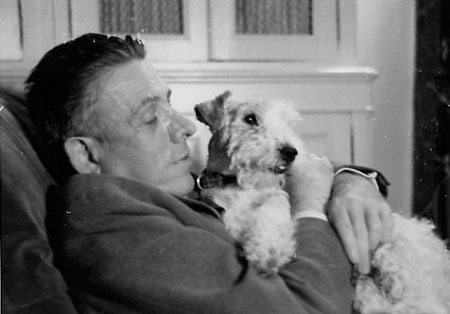 ,
, Stravinsky and his family. They
all came to the tailor for their clothes. Stravinsky
had a wonderful tweed coat of all colours. F.
ordered a pair of burnt sienna plus-fours, which
very nearly fitted him. At any rate they were
all delighted with themselves. I found Frank
Harris
and his wife at Vogade's and had tea with
them. The next day was the Carnival. It was a
glorious spectacle with enormous figures of the most
beautiful colours; I should imagine very much like
a Roman festival, the sculpture of the figures was
magnificent. We wore wire masks with faces
painted on them. On one day of the carnival little
balls of plaster confetti are thrown by the population
at each other and anyone else who is there. The mo
ment the confetti hits you it becomes powder and it
is extremely dangerous. People have had their eyes
injured for weeks afterwards. We dined at Caressa's,
near the Place Massena, and walked round the
town. We found somewhere in the back streets a
cafe with the noise of a mechanical piano and went

in to find French sailors, the cc Marine Militaire "
dancing. We joined them and bought them drinks.
R. and I then went to the bar of the Hotel Negresco
and sat amongst the Americans and English. Un
fortunately, I had to leave the next day and my
friends saw me off at the station. I started on
the dismal return journey to Paris. I had stayed
nine weeks with my friends who seemed to have
liked my company and asked me to come back as
soon as I could.
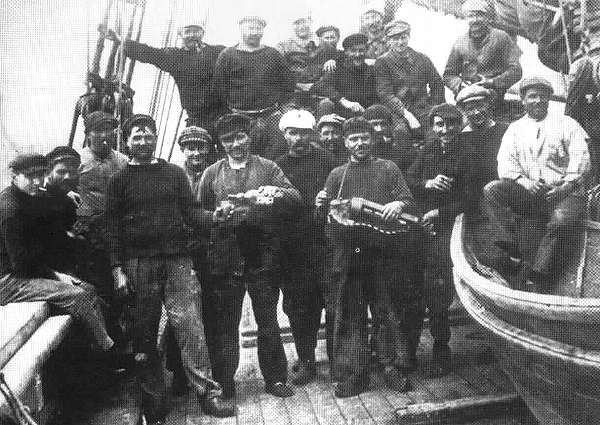
THERE were two very nice American boys called
Ralph Sabatini and Julian Levy. They were friends
of Frank's and also spoke very good French. We
spent a lot of our time together; they were both
talented and very enthusiastic about everything.
Ralph wanted to do a copy of the Uccello in the
Louvre. This is the other half of the one in the
National Gallery, but it is in very bad condition,
whereas the one in London looks as if it had been
painted only recently. Ralph bought a canvas half
the size of the original; this was about eleven feet
long, and we set it up on an easel in the Louvre.
The attendant of the room he was working in came
up to him. On seeing what he was about to do he ex
plained to him that during his career in the Louvre
he had seen many people start copying this picture;
so far, he had never seen anyone finish it. I don't
know how many times Ralph went to the Louvre,
but I remember that, one day, Julian and I arrived
at his studio near the Sorbonne and there it was,
half finished. We condoled with him and he said
that he had bought a large number of photographs
and had already put indications of the colours on the
canvas and proposed finishing it at home. Julian
and I were delighted; we said that we would come
and help him. Julian went out and bought some
bottles of wine and we all three started. We worked
away for hours, it was great fun, and it really de
veloped into a most extraordinary picture. I would
do a helmet, Ralph would paint the body, and
Julian would do the legs. It was an imposing pic
ture, distinctly reminiscent of Uccello, but somehow
different. Ralph took it back to America with him
and, I believe, sold it to a museum. Ralph and
Julian both went back to America, unfortunately,
and the detachments of Americans sent over got
steadily worse and worse.
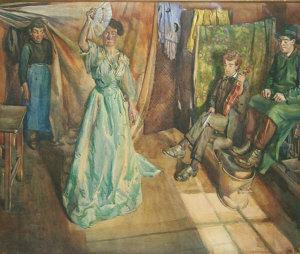
One day I found Tuohy in Montparnasse.
He
said that he and a friend of his, Kinko, an Irish girl,
and two other friends were taking a cottage in
Brittany on an island called Brehat. They asked me
They asked me
to join them, but I could not for some reason or
other. One day the Dingo, where I went often,
became inundated with most of the crew of the
American flagship " Pittsburgh They talked to
everyone, they fought and drank, they ate beef
steaks with bottles of tomato sauce, and bought
everyone drinks. All the ladies from miles around
arrived, and the Quarter brightened up. I made
friends with a fat electrician, who was charming,
and made more noise after, as he described them,
" a flock of ginfizzes," than anyone I had ever
met. I painted his portrait, which he sent to his
Mother; he also paid me for it. The sailors who
did not get fighting drunk I found very amusing,
and quite different from any other kind of person
that I had met. My fat friend, if he was not on
leave at a certain time, would send his friends to me
to look after. He sent two ridiculous little creatures
one day, who were about eighteen. I looked after
them and told them where to go. Even in London

when I got back in 1926, I found two American
sailors in their bell-bottomed trousers and white
hats waiting for me in the Fitzroy Tavern, much
to the amusement of everybody. I found it rather
embarrassing as I did not know what to do with
them.

My friend Prudence was still in Paris and was engaged to perform at the Four Hundred Club. She worked daily with a pianist in a large room which was let out for dancers to rehearse in. I went, in the afternoons, to watch her. I went with my French friends to see her the first night. She looked perfectly beautiful, although I do not really like acrobatic dancing; I think it is ugly and un gainly.We then went to the Jardin de ma Soeur
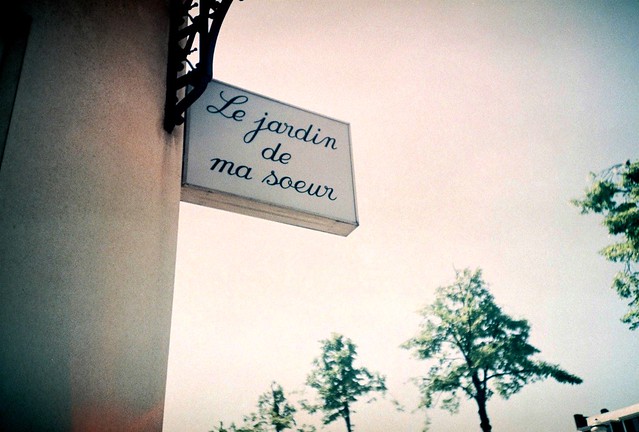 and to Montmartre.
and to Montmartre. One day Tuohy and Kinko came from the island in Brittany in their two seater Citroen. They said, " Come back with us." I took my water-colours and a rucksack with a few clothes and got in. One of us had to sit on the back of the seat on the folded hood. They both drove in turns and one or other of them would change places with me.
I was de lighted with the idea of seeing Brittany again. They said that there was no need to hurry and that we could take our time and see some of the towns on the way. We spent the night at Dreux.
 Tuohy told me that they had invented the " Anti-omelette club as none of them liked omelettes. The first thing to do on arriving at an inn or restaurant was to say, before stepping inside, " Pas omelette s'il vous plait" He said that, frequently, when motoring up the drive, approaching the hotel, you could hear them beating up the eggs. At Dreux we had no omelettes. We spent the next night at Mayenne,
Tuohy told me that they had invented the " Anti-omelette club as none of them liked omelettes. The first thing to do on arriving at an inn or restaurant was to say, before stepping inside, " Pas omelette s'il vous plait" He said that, frequently, when motoring up the drive, approaching the hotel, you could hear them beating up the eggs. At Dreux we had no omelettes. We spent the next night at Mayenne, 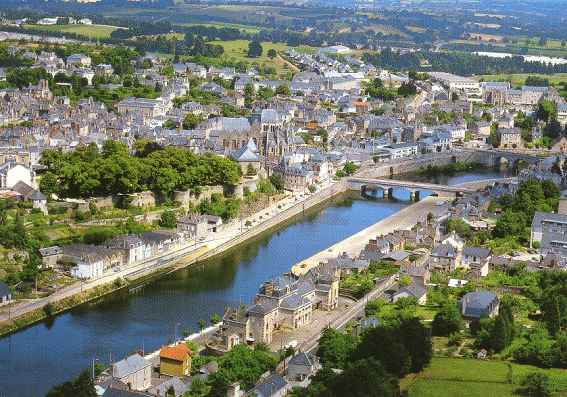
which amused me as this was where Edgar had been stationed after he left England and I had received from him many picture postcards of the place. We went further and further north and finally came to Paimpol,
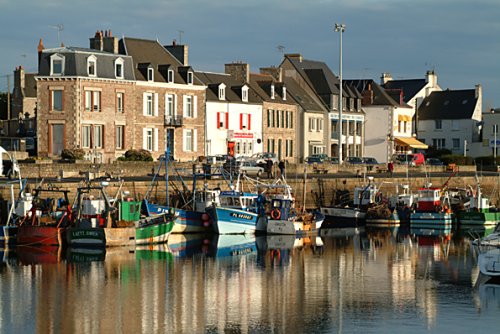
which was not far away from the island. We stopped for a drink and then drove to FArcouest. The motor was put into the garage there and we took the "Vedette a small motor-boat, to the island. Brehat

, at this time, was quite unspoilt, and a few French people came there year after year. There was a hotel and cafe by the port and a comfortable hotel with bath-rooms somewhere else. We walked down a path as there were no roads and only one horse and cart on the island.
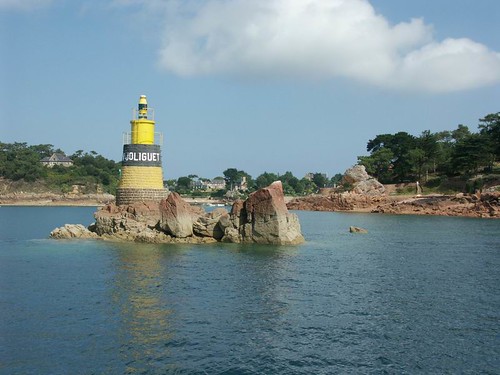 We came to the square where the Town Hall was, a rather battered- looking thatched house which was labelled " MAIRIE " in stone letters. Just outside the square was a rather new cafe. In the square was a covered- in terrasse on one side of the path leading to an inn, and on the others, chairs and tables under the trees.
We came to the square where the Town Hall was, a rather battered- looking thatched house which was labelled " MAIRIE " in stone letters. Just outside the square was a rather new cafe. In the square was a covered- in terrasse on one side of the path leading to an inn, and on the others, chairs and tables under the trees. 
We rested ourselves and I was introduced to Madame Balet and her husband, who had been a chef. We then walked across the island through flat fields. The house was the other side and faced many little islets, mostly uninhabited and consisting of yellow ish rocks which became as bright and yellow as gold when the sun shone. It was a most beautiful place. The sea was so blue; I thought a much finer blue than the Mediterranean. The whole atmo sphere of Brittany reminded me of Wales and I felt quite at home there. The house was in a row with three or four other houses. I slept in a large room underneath the roof with beams; it had windows on each of the four walls. Our house was surrounded by a small garden and not attached to the houses each side. I found many subjects to paint and started some water- colours. There were some charming French people who lived on the island and we had aperitifs with them at Madame Balet's before dinner.
There was Monsieur Negroponte, who was really a British subject, having been born in Egypt. He had had a son in an English regiment during the War, but he could only speak a very little English himself. He had been a very good-looking man when he was young and still was most amusing and attractive. He wore a sailor's peaked cap and a check coat. There were some French painters there and a French marquis who lived in a chateau near Guingamp,
 not very far away on the mainland. They gave dinner-parties at the hotel with enormous fish, cooked specially by Monsieur Balet, and to which I was sometimes invited. The native women, mostly the older ones, wore the national costume. Black clothes and enormous black poke bonnets with strings under their chins. I did some drawings of them. Tuohy wrote most of the day and I drew and painted. Sometimes we took the boat to the mainland and motored round the countryside. Kinko knew Brittany very well and had, in fact, written articles on it for papers. The Bretons liked us very much and I always said that I was Galloise and they said that they were Irlandais. The Bretons and Tuohy understood each other perfectly. At
not very far away on the mainland. They gave dinner-parties at the hotel with enormous fish, cooked specially by Monsieur Balet, and to which I was sometimes invited. The native women, mostly the older ones, wore the national costume. Black clothes and enormous black poke bonnets with strings under their chins. I did some drawings of them. Tuohy wrote most of the day and I drew and painted. Sometimes we took the boat to the mainland and motored round the countryside. Kinko knew Brittany very well and had, in fact, written articles on it for papers. The Bretons liked us very much and I always said that I was Galloise and they said that they were Irlandais. The Bretons and Tuohy understood each other perfectly. At FArcouest, where the " Vedette " crossed to, was a hotel, and we used to have drinks, not with the tourists, but in a little side bar where the sailors went. The patron had a chien de chasse, a setter, of which he was very proud. His wife had a short, fat, white dog who wheezed. One day the patron went off to faire la chasse, taking both the dogs with him. To his horror his famous setter had no scent at all and the short fat dog was the success of the party. His wife laughed loudly when they came home. One day Kinko was expecting some money from her Father and, as Tuohy was working, we went together to the Post Office, which was near the square. She found it waiting for her and spoke of three hundred francs. We went to the dull new cafe and started to celebrate the event. We had also promised to buy the lunch. We arrived home rather later than we intended and, after eating, retired to rest. During the afternoon Kinko said, " I have mislaid my money, perhaps I have dropped it or hidden it somewhere." We searched the house and could not find it. We consoled ourselves by playing Mah Jong. None of us really attained great pro ficiency in this game but we liked handling the pieces. The next morning I was in the kitchen. The fire was not lit and it had not been cleared out since the day before. It was an old-fashioned stone stove, built into the room with a hole underneath with a grating for the ashes to drop through. I saw, sticking out, a piece of a five-franc note. I put my hand in and there was all the money including a five-pound note and several hundred-franc notes, some tens, and the five-franc one that had only had its edge burnt. This find, of course, called for another celebration. Hiding money reminded me of the Modigliani hundred-franc note and that ce It's an ill wind, etc.," but we were pleased that it was us who found it rather than the rather bad-tempered and incredibly inefficient charwoman. I found an old friend of mine whom I had known in London during the war; I had known him with Constance Stuart Richardson and Mario Colonna. He had been to Spain and had taken the most beautiful photographs of Spanish architecture. He already knew Tuohy and Kinko but they didn't know that I had known him before. He knew everyone as he came to the island every year. He said that he would come and cook us a Hungarian goulash one evening, and told us what we must buy and that he would bring the other ingredients with him. We spent the day getting food and drink in and arranged the whole dinner with different kinds of wine. The goulash took a long time to make and the smell from the kitchen was terrific. Finally it appeared and we all stuffed ourselves. During the night we suffered from the effects of the Paprika and in the morning felt very ill. It took us three days to recover. It was, unfortunately, too hot and too rich for us. One day a most curious thing happened. We were celebrating someone's birthday at Madame Balet's and came home rather late. I carried the lantern, with which we crossed the island at night, because it was completely dark if there was no moon and impossible to find the path. I carried a ship's lantern; we used it as light in the sitting-room as there was no gas or electric light. We crossed the fields, and on the other side was a narrow path, on one side was the hedge of a garden belonging to a house.
FArcouest, where the " Vedette " crossed to, was a hotel, and we used to have drinks, not with the tourists, but in a little side bar where the sailors went. The patron had a chien de chasse, a setter, of which he was very proud. His wife had a short, fat, white dog who wheezed. One day the patron went off to faire la chasse, taking both the dogs with him. To his horror his famous setter had no scent at all and the short fat dog was the success of the party. His wife laughed loudly when they came home. One day Kinko was expecting some money from her Father and, as Tuohy was working, we went together to the Post Office, which was near the square. She found it waiting for her and spoke of three hundred francs. We went to the dull new cafe and started to celebrate the event. We had also promised to buy the lunch. We arrived home rather later than we intended and, after eating, retired to rest. During the afternoon Kinko said, " I have mislaid my money, perhaps I have dropped it or hidden it somewhere." We searched the house and could not find it. We consoled ourselves by playing Mah Jong. None of us really attained great pro ficiency in this game but we liked handling the pieces. The next morning I was in the kitchen. The fire was not lit and it had not been cleared out since the day before. It was an old-fashioned stone stove, built into the room with a hole underneath with a grating for the ashes to drop through. I saw, sticking out, a piece of a five-franc note. I put my hand in and there was all the money including a five-pound note and several hundred-franc notes, some tens, and the five-franc one that had only had its edge burnt. This find, of course, called for another celebration. Hiding money reminded me of the Modigliani hundred-franc note and that ce It's an ill wind, etc.," but we were pleased that it was us who found it rather than the rather bad-tempered and incredibly inefficient charwoman. I found an old friend of mine whom I had known in London during the war; I had known him with Constance Stuart Richardson and Mario Colonna. He had been to Spain and had taken the most beautiful photographs of Spanish architecture. He already knew Tuohy and Kinko but they didn't know that I had known him before. He knew everyone as he came to the island every year. He said that he would come and cook us a Hungarian goulash one evening, and told us what we must buy and that he would bring the other ingredients with him. We spent the day getting food and drink in and arranged the whole dinner with different kinds of wine. The goulash took a long time to make and the smell from the kitchen was terrific. Finally it appeared and we all stuffed ourselves. During the night we suffered from the effects of the Paprika and in the morning felt very ill. It took us three days to recover. It was, unfortunately, too hot and too rich for us. One day a most curious thing happened. We were celebrating someone's birthday at Madame Balet's and came home rather late. I carried the lantern, with which we crossed the island at night, because it was completely dark if there was no moon and impossible to find the path. I carried a ship's lantern; we used it as light in the sitting-room as there was no gas or electric light. We crossed the fields, and on the other side was a narrow path, on one side was the hedge of a garden belonging to a house.Suddenly, in the middle of the path, we saw two creatures. They were about eight inches long, like lizards, with high front legs like chameleons. They had broad black-and-yellow stripes all over them, long tails, huge eyes that they rolled at us and long tongues which shot in and out. This really was a startling spectacle in the middle of the night, and we all turned rather pale and walked on in silence. I went to the cafe the next morning by myself, as I had to go to the Post Office, and I asked Madame Balet what the curious creatures were that we had seen the night before.

She said that they were Salamanders and that it was very rare to see them as the Bretons kill them. They are in the arms of Francis I, who was the first king to put down the Bretons. We bathed from the rocks in front of the house, but we had to wait till the tide came up and it was about twenty feet deep, so I could only cling on to a rock as I could not swim. We bathed also from a little beach at the back of the island. This had sand and I could go in up to my neck. Tuohy swam very well and would swim far away to a rock. One day he swam out of his bathing suit. Kinko and I stood on the sea-shore and laughed at him as he swam after it. One morning we decided to do a tour of Brittany in the motor. We started off early. We stayed the first night at Morlaix,
 a town which I wanted to see, as it was there that Tristan Corbiere
a town which I wanted to see, as it was there that Tristan Corbiere lived, and I knew his book of poetry, Les Amours Jaunes, quite well. Sophia Brzeska read them all the time to me when I was with her at Wooton-under- Edge.
lived, and I knew his book of poetry, Les Amours Jaunes, quite well. Sophia Brzeska read them all the time to me when I was with her at Wooton-under- Edge. It is rather a beautiful old town with some very fine old carved houses. The hotel was very expensive and filled with very dull French commer- gants. We went to RoscofF, which has been com pletely ruined by the English. After Roscoff we motored through wild moors and hills. This land scape might easily have been Ireland or Wales. At Huelgoat
It is rather a beautiful old town with some very fine old carved houses. The hotel was very expensive and filled with very dull French commer- gants. We went to RoscofF, which has been com pletely ruined by the English. After Roscoff we motored through wild moors and hills. This land scape might easily have been Ireland or Wales. At Huelgoat  is an extraordinary valley with huge rocks. They said that they were of volcanic origin. There is one particularly large stone which is called cc Le Rocher tremblant" This, if pushed in the right place, rocks to and fro. The guide could do it but we could not. We saw many churches with painted wooden sculptures and effigies of the Breton Saints. We found a church at Pleyben.with a statue of Saint Herbot. He is the patron of cows, and on a stone table under his effigy were a collection of cows' tails, offerings to him for his kindly services in saving their lives from various diseases. Many of these statues are of the fifteenth century. In the Chapelle de Notre Dame du Huat are the statues of six saints in painted wood. They stand in a row: Saint Lubin, who deals with every kind of affliction" Saint Mamert, who takes upon himself all troubles of the stomach, and is seen holding his entrails in both hands; Saint Meen, who looks a little " gaga and represents La Folie; Saint Hubert, who gives his protection to those who are bitten by dogs; Saint Livertin, for the maladies of the head, is re presented holding his head with a pained expression on his face; lastly. Saint Houarniaule, who pro tects people suffering from fright. We visited Douarnenez and I took Tuohy and Kinko to see the old ladies in the cafe on the Quays. (I wished that Frank had been with us.) They remembered us both and were most pleased to see us. We went to Pont Croix,
is an extraordinary valley with huge rocks. They said that they were of volcanic origin. There is one particularly large stone which is called cc Le Rocher tremblant" This, if pushed in the right place, rocks to and fro. The guide could do it but we could not. We saw many churches with painted wooden sculptures and effigies of the Breton Saints. We found a church at Pleyben.with a statue of Saint Herbot. He is the patron of cows, and on a stone table under his effigy were a collection of cows' tails, offerings to him for his kindly services in saving their lives from various diseases. Many of these statues are of the fifteenth century. In the Chapelle de Notre Dame du Huat are the statues of six saints in painted wood. They stand in a row: Saint Lubin, who deals with every kind of affliction" Saint Mamert, who takes upon himself all troubles of the stomach, and is seen holding his entrails in both hands; Saint Meen, who looks a little " gaga and represents La Folie; Saint Hubert, who gives his protection to those who are bitten by dogs; Saint Livertin, for the maladies of the head, is re presented holding his head with a pained expression on his face; lastly. Saint Houarniaule, who pro tects people suffering from fright. We visited Douarnenez and I took Tuohy and Kinko to see the old ladies in the cafe on the Quays. (I wished that Frank had been with us.) They remembered us both and were most pleased to see us. We went to Pont Croix, where all the houses are white with grey stones down each side. There is a marvellous church porch here. We got to the Point de Raz, which is the most western point of France. In the distance is the island of Ouessant,
where all the houses are white with grey stones down each side. There is a marvellous church porch here. We got to the Point de Raz, which is the most western point of France. In the distance is the island of Ouessant, in English, Ushant. This gave me an unpleasant feeling as I remembered the name in connection with history at school. This island has two or three hundred in habitants, who are very poor indeed, and, until two hundred years ago, were pagans. The sea is so rough between the island and the Point du Raz
in English, Ushant. This gave me an unpleasant feeling as I remembered the name in connection with history at school. This island has two or three hundred in habitants, who are very poor indeed, and, until two hundred years ago, were pagans. The sea is so rough between the island and the Point du Raz  that, sometimes, it is impossible for them to come ashore for months. Even the men in the lighthouse quite close to the Point are cut off for weeks at a time. We had some wine at the hotel near by and then became very courageous and said that we would like to walk round the Point. One has to take a guide. I was extremely surprised on returning to find myself alive. It Is a most terrifying experience. We had to walk along a very narrow path. On one side of the Point was a whirlpool which churned and seethed and the water dashed nearly up to our feet.
that, sometimes, it is impossible for them to come ashore for months. Even the men in the lighthouse quite close to the Point are cut off for weeks at a time. We had some wine at the hotel near by and then became very courageous and said that we would like to walk round the Point. One has to take a guide. I was extremely surprised on returning to find myself alive. It Is a most terrifying experience. We had to walk along a very narrow path. On one side of the Point was a whirlpool which churned and seethed and the water dashed nearly up to our feet. The path was on the edge of a precipice with no protection whatever. I ran along it quickly, as I really felt as if my last minute had come. We asked the guide if people ever fell over or got giddy. He said that six had the previous year and when once they went overboard they were gone for ever, as they were dashed to pieces im mediately on the rocks below.
We were led on and round the end of the Point; we had to cling on to rocks and grass. This continued until we were nearly completely round the Point. We immediately returned to the hotel and had some more wine to calm our shattered nerves. We came to a strange place with savage dark people and strange old ladies, wearing antique costumes of, I should imagine, the eighteenth century.
With difficulty we found someone who spoke French. The place was called Ploneour
 . Outside the church was the funniest War Memorial that I have ever seen. It must have been sculptured by the local stone-cutter. It represented two soldiers standing each side of a tablet, on which were written a list of the names of the dead. The two soldiers were identical and were exactly like the wooden soldiers in the song.
. Outside the church was the funniest War Memorial that I have ever seen. It must have been sculptured by the local stone-cutter. It represented two soldiers standing each side of a tablet, on which were written a list of the names of the dead. The two soldiers were identical and were exactly like the wooden soldiers in the song.  I wish I could have taken a photograph of it or that I had had time to do a drawing. We came to another strange place called He Tudy. Here the origin of the people appears to be unknown. They are very dark and unlike the Bretons. It becomes an Island at high tide. We went to Benodet and had to cross a river. To do this one had to take a large ferry boat. We drove the car into it and as we were waiting for it to start I did a drawing of the opposite bank, with large trees, a white hotel, and a red gipsy caravan. I painted it when we got home and was quite pleased with it. We passed through La Foret, which is a very pretty place with the slowest hotel in the world. It is true that in France if you, do not arrive between stated hours you have to go hungry. We only asked for bread and cheese and cider and we had to wait about an hour, which was very bad indeed for our tempers. Our tempers were mar vellous and even when we had punctures and break downs and lost our way we never got cross with one another. We spent the night at Concarneau. The line of old ladies and gentlemen were still there and gave me the appearance of never having moved since the last time I saw them. I noticed that their painting had made no visible progress. I expect they are still painting. We stayed the night in a hotel overlook ing the fortress, which looked beautiful with the grey reflections of its walls on the blue waters. We had one look at Pont Aven and Kinko and Tuohy thought that it was as dull as Frank and I had found it. We found ourselves at Hennebont. It had a fine fortress and was free from foreigners. We visited a cafe and found there all the maids of the opposite hotel. They seemed never to have seen 290 PARIS AND BRITTANY anything like us before or, in fact, to have encoun tered any English. We entertained them and our selves to Vermouth Cassis, which seemed to mount to their heads with great rapidity. They got very talkative and most confidential, and we became rather nervous in case the angry patron, or worse still, patronne, of the hotel came and objected to us leading the staff astray. We rapidly entered our motor and drove away before trouble took place. We were punished for this disgraceful behaviour and, on the road to Auray, had three punctures and arrived all in the vilest of tempers. We found a horrible hotel all got up in oak and plates on the walls like something that is labelled in England, " Ye olde," etc. With difficulty we got some food and hurried rapidly away to Vannes where we spent the night in a very good and inexpensive hotel. We had been on the road four days and had not lost much time, but the money was getting very short and we had to hurry.
I wish I could have taken a photograph of it or that I had had time to do a drawing. We came to another strange place called He Tudy. Here the origin of the people appears to be unknown. They are very dark and unlike the Bretons. It becomes an Island at high tide. We went to Benodet and had to cross a river. To do this one had to take a large ferry boat. We drove the car into it and as we were waiting for it to start I did a drawing of the opposite bank, with large trees, a white hotel, and a red gipsy caravan. I painted it when we got home and was quite pleased with it. We passed through La Foret, which is a very pretty place with the slowest hotel in the world. It is true that in France if you, do not arrive between stated hours you have to go hungry. We only asked for bread and cheese and cider and we had to wait about an hour, which was very bad indeed for our tempers. Our tempers were mar vellous and even when we had punctures and break downs and lost our way we never got cross with one another. We spent the night at Concarneau. The line of old ladies and gentlemen were still there and gave me the appearance of never having moved since the last time I saw them. I noticed that their painting had made no visible progress. I expect they are still painting. We stayed the night in a hotel overlook ing the fortress, which looked beautiful with the grey reflections of its walls on the blue waters. We had one look at Pont Aven and Kinko and Tuohy thought that it was as dull as Frank and I had found it. We found ourselves at Hennebont. It had a fine fortress and was free from foreigners. We visited a cafe and found there all the maids of the opposite hotel. They seemed never to have seen 290 PARIS AND BRITTANY anything like us before or, in fact, to have encoun tered any English. We entertained them and our selves to Vermouth Cassis, which seemed to mount to their heads with great rapidity. They got very talkative and most confidential, and we became rather nervous in case the angry patron, or worse still, patronne, of the hotel came and objected to us leading the staff astray. We rapidly entered our motor and drove away before trouble took place. We were punished for this disgraceful behaviour and, on the road to Auray, had three punctures and arrived all in the vilest of tempers. We found a horrible hotel all got up in oak and plates on the walls like something that is labelled in England, " Ye olde," etc. With difficulty we got some food and hurried rapidly away to Vannes where we spent the night in a very good and inexpensive hotel. We had been on the road four days and had not lost much time, but the money was getting very short and we had to hurry. We left early the next morning and as we were nearing home we had a puncture. There was enough money to pay a man to mend it and we arrived home with exactly four francs. I don't think the whole tour had cost more than four hundred francs for the three of us. I had done quite a lot of work, nothing very large or important, but some drawings of sailors and some very nice water-colours of the island. For about thirty or forty years bad painters from all nations had found the island a paradise of " pretty " sub jects. I thought the subjects were pretty too, but oddly enough, seemed to find different ones from the old gentlemen and old ladies who, I expect, would have been horrified.
I had been on the island for five weeks and had to return to Paris. Tuohy and Kinko motored me to
 Vannes,
Vannes, where we spent the night at the hotel and I took the train from there to Paris. On my way to Paris I saw one of the most beautiful sights that I have ever seen. As the train approached Chartres there was a large plain, with corn that was just ready for cutting. It was about seven-thirty and a most perfect evening. The sun had nearly set and all the corn was a bright golden colour. The sky was purple and suddenly, on the horizon, I saw, first one and then the other spire of the cathedral of Chartres rising slowly out of the field of yellow corn.

The spires of Chartres are both different and one is taller than the other. I felt very bored with Paris. I met a very nice man called Dreydell, he is now also dead, as so many people in this book are. He bought some drawings of mine and took me to the Boeuf and to Montmartre.
I saw the Dowager Lady Michelham at the Boeuf. She was with Ethel Levy and she in troduced me. I talked a great deal of rubbish but they didn't seem to mind and gave me some cham pagne. I met with Lady Michelham several very nice Americans, including Jeff Crane and his cousins, the Pattersons, who came from Dayton, Ohio. He had a friend called Jeff Dodge, who had a beautiful apartment in the Boulevard St. Ger main. It had a garden, and instead of flowers in the flower beds there was planted thick ivy. In the middle was a fountain with a Cupid.
We sat in the garden when I visited him and drank cocktails. He had the most beautiful furniture and pots filled with flowers and leaves carved in Chinese jade, some of which had come from temples in China. These Americans were very kind to me and bought drawings and Jeff Dodge asked me to paint his portrait. I started it quite well but I forget why I never finished it.
Perhaps it will be like the portrait of the Old Master who painted a gentleman when young and then, thirty years later, added grey hair and some wrinkles, and I will finish it when I am sixty! A grand birthday party was given in an Ameri can's flat and I was asked for some unknown reason. I arrived in my workman's trousers, dressed as an apache.
The butler looked rather alarmed, but the guests liked it. I had three hundred francs in my pocket. We had a magnificent dinner with cham pagne and brandy and danced, and about two a.m. I left. I went to a cochers 5 restaurant near the Gare Montparnasse, which the inhabitants of the Dome visited after two a.m., to eat soup a roignon. I thought that I might find someone that I knew. The patron knew me and the inhabitants were delighted. The clientele: chauffeurs, workpeople, apaches and the ladies from the neighbouring houses. The ladies wore bedroom slippers, no hats, and shawls. I sat down with them and drank white wine and ate snails. By this time the wine had gone to my head and, as two policemen had come in and were drinking at the bar, the patron asked them if they would be kind enough to see me home, as I only lived a few doors away. The policemen were much amused and both offered me their arms. I gave them a few francs and they left me at my hotel.
If anyone is behaving in an eccentric fashion and obviously enjoying themselves, I have always found the French willing to join in the fun. Of course, now and then foreigners perfectly innocent intentions have been mistaken, and everyone has ended " au violon" Jeff and I used to go out for terrific evenings in Montmartre. We would put on our best clothes and dine at some grand place and then " do " the mountain. One night, very late, almost five-thirty in the morning, we went to a negro cabaret and restaurant. It was kept by a very pale negress and her husband, who was very black. We had some champagne and Jeff said to Palmer, the husband, " Well, Palmer, it's a curious thing, every day Florence gets whiter and whiter and every day you get blacker and blacker." And Palmer said respect fully, " Yea, Mr. Crane." I had met at Pascin's a little clown called " Char ley," he was at the Cirque de Paris. He had a partner and they were funny at times. I was dis cussing him with Iris Tree one day and said, " It's a curious thing that Charley has not made a greater success." And Iris said that, " If you were going to be a clown at all you had either to be very funny and original indeed or not a clown at all."
At any rate he was a most amusing companion. He had crossed America several times with circuses on the road. He spoke five or six languages and, I believe, was actually a Belgian Jew. He was often with Pascin and his friends. He collected pictures, which he succeeded in wangling out of painters. He has one of mine which he acquired in a very artful manner. I was with an American judge one evening and we went to the circus. Charley was really funny on that occasion and extremely vulgar. We went round to his dressing-room, which was a wonderful place. It had all his properties hanging upon the wall. An enormous cardboard razor and a pair of imitation breasts made of papier mache, which hung up on a string and a miniature fire engine, a miniature hearse, which was used for the funeral of a flea (I forget how this tragedy took place), and an imitation Turkish bath, in which a body was taken out boiled to death.
Sometimes, if Charley was in a good temper, he would give one some relic with which one could play awful jokes on one's friends. We asked Charley to come to Montmartre with us after the show. He came with us during the interval in his costume to have a drink at the bar of the cir cus.
 Descamps, Carpentier's trainer, was nearly always there and all kinds of sporting people. We sat up at the bar and bought Charley and the other clowns drinks. I found the circus people most charm ing and unpretentious. They are a most cosmopoli tan race and they all speak so many languages that it is difficult to know which race they belong to.
Descamps, Carpentier's trainer, was nearly always there and all kinds of sporting people. We sat up at the bar and bought Charley and the other clowns drinks. I found the circus people most charm ing and unpretentious. They are a most cosmopoli tan race and they all speak so many languages that it is difficult to know which race they belong to.After the performance we collected Charley and took a taxi to Montmartre. When we got into the taxi Charley found on the floor a garment of some kind, and when we passed a bright light, Charley held it up and we saw that it was a black female coat with a cape attached, very fashionable at the moment. Charley said, " You can have it if you give me a picture in return/ 3 and I said, " All right! " I rather regretted it afterwards, as Charley came to my place and chose a very nice oil-painting. He had paintings by half the well-known artists in Paris, which he had wangled one way and another. There was a story of a very famous painter who was a ter rible drunkard. His pictures are now worth thousands of francs. He will give them away if he is not prevented from doing so. He lives in Montmartre with his Mother and his stepfather. He is one of those unfortunate people who, like my Australian soldier, simply cannot drink a drop, without having to continue. A friend of mine was at his house one evening and Charley came in. She noticed that his pockets rather bulged. He went out of the room and then came back. Presently loud shrieks were heard. These were from the unfortunate painter who, although a man of nearly fifty, was being unmercifully beaten by his stepfather for having exchanged a picture for a bottle of drink.
This poor painter had a miserable life. One night he was found by Rubezack, wandering in the Rue de Vaugirard
 , in the pouring rain terribly drunk with carpet slippers on and no hat or coat. Rubezack, who was quite penniless, led him to the Rotonde in the hopes that he would find a picture-dealer or some kind person to pay the taxi to Montmartre. Several dealers refused, although they had made for times out of his pictures. Finally a collection was made amongst the artists and Rubezack, my Pole, and someone else took him back to his Mother's house. His Mother was very grateful to them and offered each of them one of his water-colours in return for their kindness, but they said they were old friends of his and refused to accept anything. I am afraid that I should have taken one as they are very beautiful and I have always wanted to buy one. Van Dongen
, in the pouring rain terribly drunk with carpet slippers on and no hat or coat. Rubezack, who was quite penniless, led him to the Rotonde in the hopes that he would find a picture-dealer or some kind person to pay the taxi to Montmartre. Several dealers refused, although they had made for times out of his pictures. Finally a collection was made amongst the artists and Rubezack, my Pole, and someone else took him back to his Mother's house. His Mother was very grateful to them and offered each of them one of his water-colours in return for their kindness, but they said they were old friends of his and refused to accept anything. I am afraid that I should have taken one as they are very beautiful and I have always wanted to buy one. Van Dongen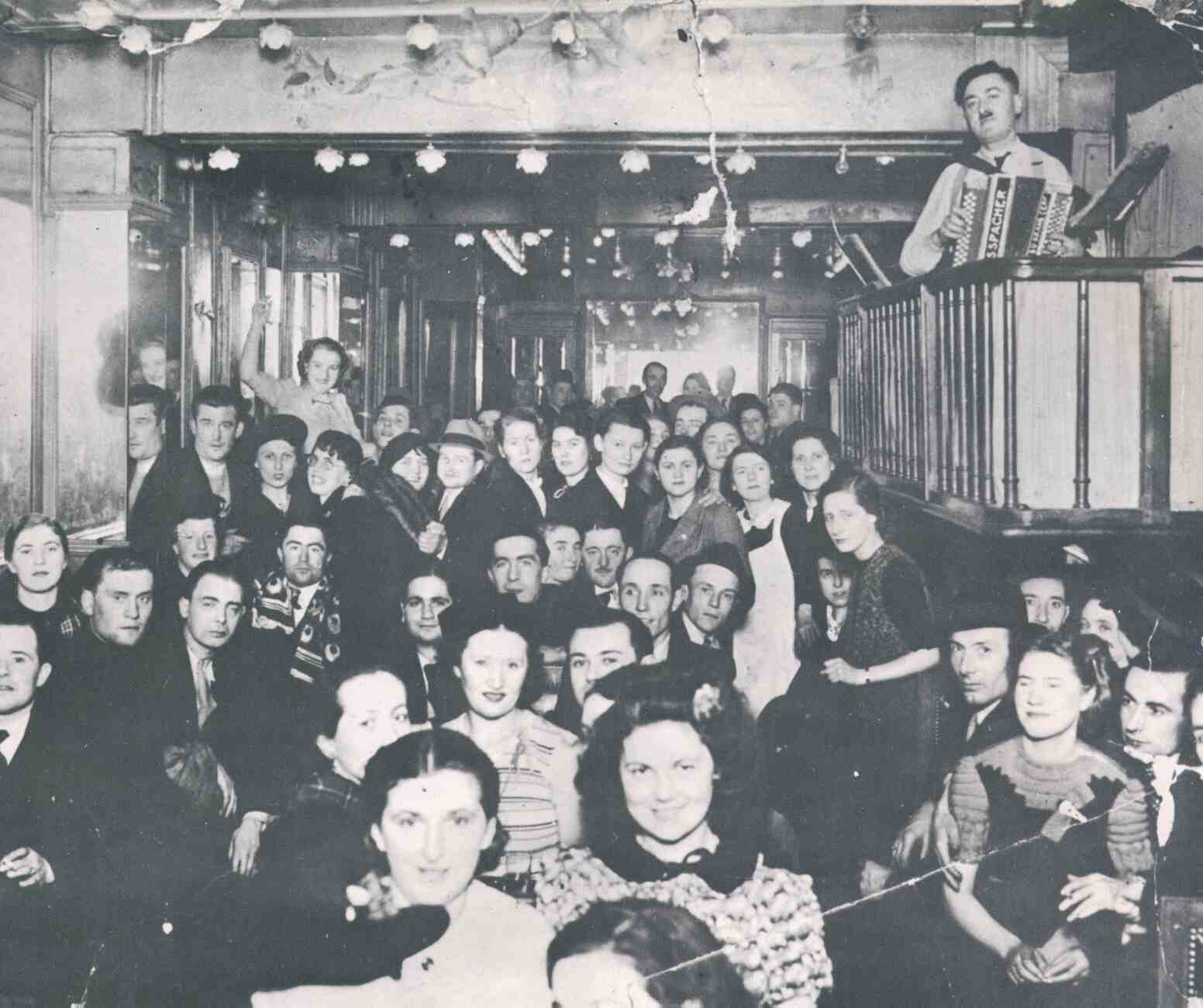 These bands are wonderful to dance to as their sense of time is perfect, and the French workpeople dance so well. At one time Ford hired a Bal Musette once a week and invited his friends, but it ended in a disturbance between the intellec tuals who wanted to talk and the dancers who wanted to dance and to drink. Van Dongen's parties were the best that I have ever been to.
These bands are wonderful to dance to as their sense of time is perfect, and the French workpeople dance so well. At one time Ford hired a Bal Musette once a week and invited his friends, but it ended in a disturbance between the intellec tuals who wanted to talk and the dancers who wanted to dance and to drink. Van Dongen's parties were the best that I have ever been to. There was plenty of champagne, the only drink to have at a party. Unfortunately there are those that it makes ill, but I think that they are in the minority. There were the most beautiful and elegant collection of women I have ever seen.
There was plenty of champagne, the only drink to have at a party. Unfortunately there are those that it makes ill, but I think that they are in the minority. There were the most beautiful and elegant collection of women I have ever seen. One South American had a Lanvin dress of white silk with an enormous white bow, edged with black, that covered nearly the whole of her skirt and looked like a huge butterfly. Van Dongen introduced me to a few people, includ ing a most charming Frenchman who wrote a great deal about the discoveries of Glozel and the tremen dous controversy there was about them.
One South American had a Lanvin dress of white silk with an enormous white bow, edged with black, that covered nearly the whole of her skirt and looked like a huge butterfly. Van Dongen introduced me to a few people, includ ing a most charming Frenchman who wrote a great deal about the discoveries of Glozel and the tremen dous controversy there was about them.  He sat with me and pointed out all the celebrities and in troduced me to anyone I wanted to meet. There was an electric gramophone and a Breton singer, a woman who sang Breton songs and was very cele brated on the music halls. Andre Warnod was there with his wife.
He sat with me and pointed out all the celebrities and in troduced me to anyone I wanted to meet. There was an electric gramophone and a Breton singer, a woman who sang Breton songs and was very cele brated on the music halls. Andre Warnod was there with his wife. 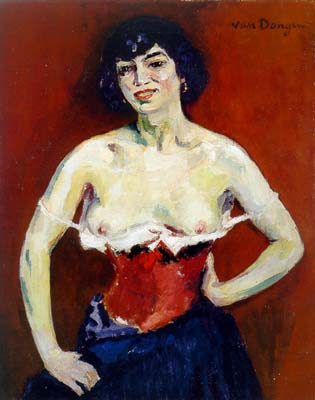 I told Van Dongen about Prudence and the monkeys and how beautiful she was, and he asked me to bring her and ask her to dance. She came with her dancing clothes and her accompanist. Most of the audience sat on the floor. She was an enormous success. If she had done nothing except stand still and smile she would have brought any house down. The women were most enthusiastic.
I told Van Dongen about Prudence and the monkeys and how beautiful she was, and he asked me to bring her and ask her to dance. She came with her dancing clothes and her accompanist. Most of the audience sat on the floor. She was an enormous success. If she had done nothing except stand still and smile she would have brought any house down. The women were most enthusiastic. I have found that Frenchwomen suffer much less from jealousy of other women than most other races. If I happened to look rather better than usual or had a dress that suited me they would crowd round me and be so sweet and kind. I think it is really because they are so sure of themselves and the idea that they should have a rival in any shape or form never enters their very elegant heads. Any- way I have always been devoted to them and wish there were more of them over here.
I have found that Frenchwomen suffer much less from jealousy of other women than most other races. If I happened to look rather better than usual or had a dress that suited me they would crowd round me and be so sweet and kind. I think it is really because they are so sure of themselves and the idea that they should have a rival in any shape or form never enters their very elegant heads. Any- way I have always been devoted to them and wish there were more of them over here.  One evening I brought Peter Johnstone, who is now Lord Derwent, with me. He had a most terrific success, especially as he spoke such excellent French. I also brought an American opera-singer who sang. I think in the end, as so often happens,, Van Dongen's hospitality was abused by " gate crashers/ 5 and the parties came to an end. Madame Van Dongen is one of the most charming and most elegant women I have ever met, and I had the pleasure of seeing her quite often when she was in London a few years ago and show ing her a few of the sights. Van Dongen painted a portrait of Prudence.
One evening I brought Peter Johnstone, who is now Lord Derwent, with me. He had a most terrific success, especially as he spoke such excellent French. I also brought an American opera-singer who sang. I think in the end, as so often happens,, Van Dongen's hospitality was abused by " gate crashers/ 5 and the parties came to an end. Madame Van Dongen is one of the most charming and most elegant women I have ever met, and I had the pleasure of seeing her quite often when she was in London a few years ago and show ing her a few of the sights. Van Dongen painted a portrait of Prudence. It was an enormous canvas, I should think over life-size, in a green satin dancing dress and a green satin top-hat.
It was an enormous canvas, I should think over life-size, in a green satin dancing dress and a green satin top-hat.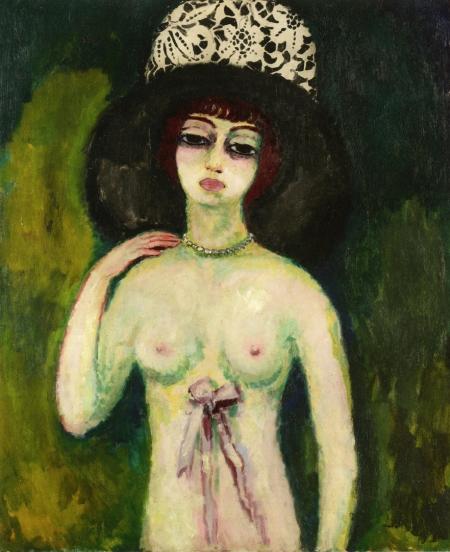 I sat behind him and drew his back. He looks very funny when he paints. He wears a hat and a long black coat like a house-painter. He begins a portrait by drawing it in charcoal; in one hand he holds a large feather duster with which, now and then, he dusts the charcoal off and corrects the drawing. The extra ordinary sureness with which he applied the colour astounded me and I began to think that if I sat behind him and watched long enough I should also become a society portrait painter. The portrait was exhibited at the Salon. One day I went to F. and R/s flat and found Radiguet, Yvonne George, Cocteau, Marie Beer- bohm and several other people, and we had some cocktails. I sat and talked to Radiguet.
I sat behind him and drew his back. He looks very funny when he paints. He wears a hat and a long black coat like a house-painter. He begins a portrait by drawing it in charcoal; in one hand he holds a large feather duster with which, now and then, he dusts the charcoal off and corrects the drawing. The extra ordinary sureness with which he applied the colour astounded me and I began to think that if I sat behind him and watched long enough I should also become a society portrait painter. The portrait was exhibited at the Salon. One day I went to F. and R/s flat and found Radiguet, Yvonne George, Cocteau, Marie Beer- bohm and several other people, and we had some cocktails. I sat and talked to Radiguet. 
Radiguet died in Paris in 1923 at age 20 of typhoid fever, which he contracted after a trip he took with Cocteau. In reaction to this death Francis Poulenc wrote, "For two days I was unable to do anything, I was so stunned".In addition to two novels, Radiguet's works include a few poetry volumes and a play.
He asked me when I was going to draw him. I had arranged for him to sit some time before, but he had not come. I said that I would some day soon. Ten days afterwards I heard that he was dead. He had been taken ill at Foyot's, where he had been staying; a doctor had not been sent for until he had already got pneumonia and a few days later he was taken to a nursing-home. The following day his Father had arrived and the door was opened by a hospital nurse, who said, " Est-ce que vous voulez vow votre fils, il est dans le mortuaire? " Radiguet was the eldest of the children and adored by his Father and his brothers and sisters, and it was a terrible shock. Marie Beerbohm told me of his death and asked me if I would go with her to his funeral. We did not look forward to it as we knew that it would be a very sad affair. This was in the month of Novem ber, and one morning at nine I fetched Marie and we went to the church, which was near the Etoile. It was foggy and raining. The church was filled with white flowers and near the altar was the raised platform, waiting for the coffin. The church was crowded with people. In the pew in front of us was the negro band from the Boeuf sur le Toit. Picasso was there, Brancusi, and so many celebrated people that I cannot remember their names. Radiguet's death was a terrible shock to everyone. " Coco " Chanel, the celebrated dress-maker, arranged the funeral. It was most wonder fully done. Cocteauwas too ill to come. We waited some minutes for the arrival of the body, in its white coffin, covered with white flowers; it was carried up the aisle and placed on the platform. After a short service we walked round the coffin and shook the Holy Water over the coffin, the men walking one side and the women the other. We could hardly see, as Marie and I and everyone else's eyes in the church were filled with tears. We had to walk round the church and shake hands with the relatives. It was the most tragic sight that I have ever seen. Radiguet's Father and Mother were there, and then his four little brothers and sisters, the youngest being about six, stood in a row, their faces contorted with weeping. Marie and I burst into tears and went out into the street to see the procession start off. The hearse was covered in white and was drawn by two large white horses, like those in the war picture by Uccello in the National Gallery. They stood patiently and waited. The coffin was carried out with its white pall, and on it was one bunch of red roses. Many wreaths were carried out, and by the time the procession started the white hearse and a carriage following were cov ered with white flowers. We walked down the boulevard, following the procession, and waited and watched the hearse and the long train of mourners disappear into the distance on their way to Pere Lachaise. It was not yet ten o'clock and still pouring with rain. Fortunately, in Paris, the cafes are open all the time, so we went to the Cafe Francis, which is near the theatre Champs Elysees, drank some brandy, and sat silently gazing at the rain. Cocteau was terribly upset and could not see anyone for weeks afterwards. I wrote to him in February and asked him if I could come and see him. He wrote me a charming letter: z^fevrier 1924, CHERE NINA, Je suis toujours trh malade et sans courage. Telephone^ un matin. De c&ur, JEAN COCTEAU." I went to see him and he had grown thin and worn. One day I received a cheque for a painting. It was in American dollars and I asked Harold Stearns where I could cash it. Harold said, " Gome with me." We went to the other side of the river to a bank and cashed it. I think it was for about eight hundred francs. We visited the New York Bar and Henri's Bar and drank champagne cocktails,
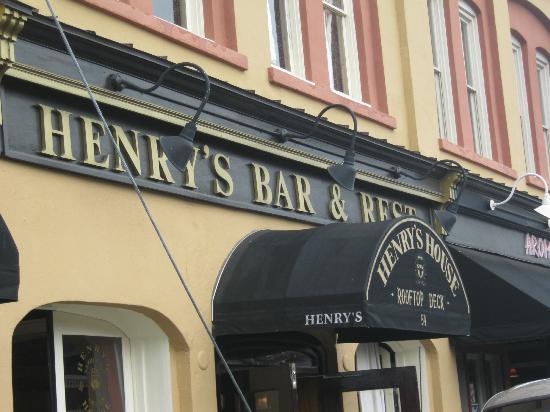 which certainly went to my head. Harold was not affected, as he had one of those heads which are only to be found attached to the bodies of Americans whose families have been in America for not less than two hundred and fifty years and want some " hitting." We came back to the Dome in a taxi and a friend of his met me inside and said, " I am with Leonard Merrick and a friend of his, and they have come to find you." I didn't know him but, of course, had read his books. Apparently my friend did not know him either and he had heard that I was a desperate character and was to be found at the Dome. I introduced myself and he introduced me to his friend, who was Edith Evans, who has since become a famous actress.
which certainly went to my head. Harold was not affected, as he had one of those heads which are only to be found attached to the bodies of Americans whose families have been in America for not less than two hundred and fifty years and want some " hitting." We came back to the Dome in a taxi and a friend of his met me inside and said, " I am with Leonard Merrick and a friend of his, and they have come to find you." I didn't know him but, of course, had read his books. Apparently my friend did not know him either and he had heard that I was a desperate character and was to be found at the Dome. I introduced myself and he introduced me to his friend, who was Edith Evans, who has since become a famous actress.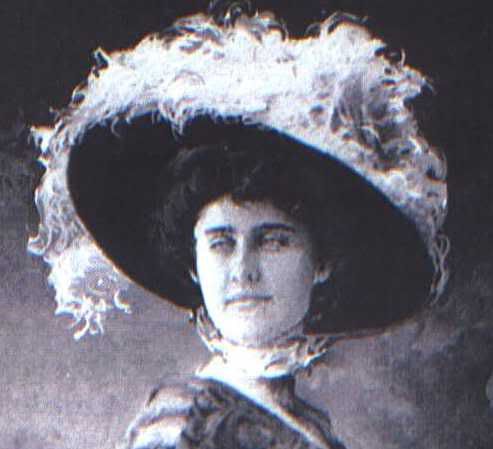

No comments:
Post a Comment